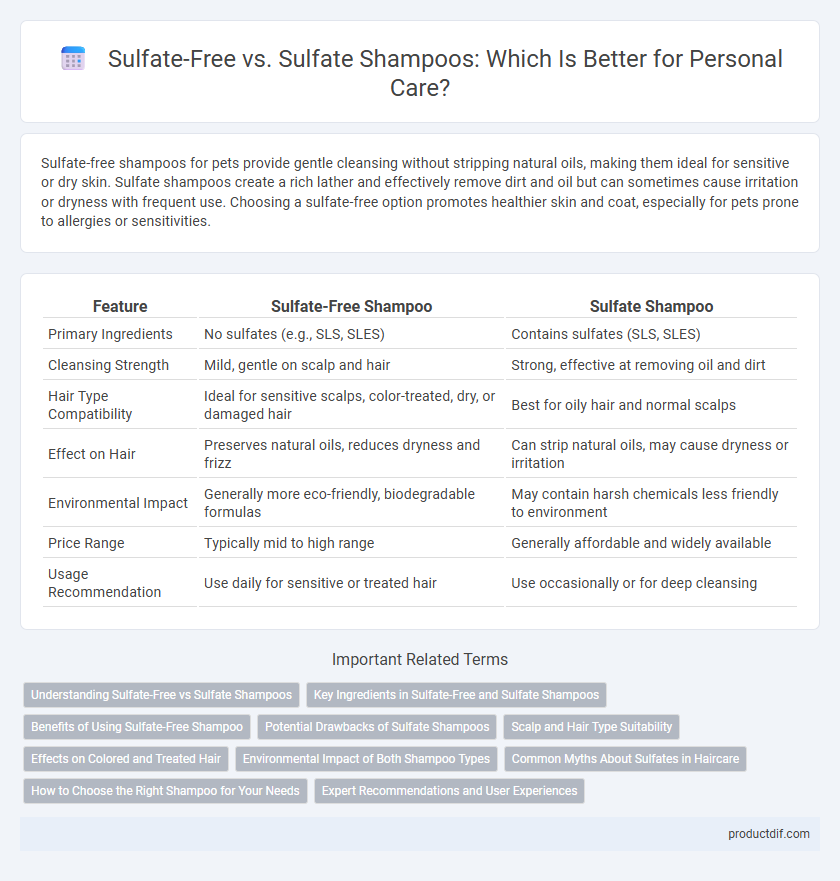Sulfate-free shampoos for pets provide gentle cleansing without stripping natural oils, making them ideal for sensitive or dry skin. Sulfate shampoos create a rich lather and effectively remove dirt and oil but can sometimes cause irritation or dryness with frequent use. Choosing a sulfate-free option promotes healthier skin and coat, especially for pets prone to allergies or sensitivities.
Table of Comparison
| Feature | Sulfate-Free Shampoo | Sulfate Shampoo |
|---|---|---|
| Primary Ingredients | No sulfates (e.g., SLS, SLES) | Contains sulfates (SLS, SLES) |
| Cleansing Strength | Mild, gentle on scalp and hair | Strong, effective at removing oil and dirt |
| Hair Type Compatibility | Ideal for sensitive scalps, color-treated, dry, or damaged hair | Best for oily hair and normal scalps |
| Effect on Hair | Preserves natural oils, reduces dryness and frizz | Can strip natural oils, may cause dryness or irritation |
| Environmental Impact | Generally more eco-friendly, biodegradable formulas | May contain harsh chemicals less friendly to environment |
| Price Range | Typically mid to high range | Generally affordable and widely available |
| Usage Recommendation | Use daily for sensitive or treated hair | Use occasionally or for deep cleansing |
Understanding Sulfate-Free vs Sulfate Shampoos
Sulfate-free shampoos use gentle cleansing agents like cocamidopropyl betaine instead of sodium lauryl sulfate, reducing scalp irritation and preserving natural oils for sensitive or dry hair. Sulfate shampoos effectively remove dirt and oil due to their strong surfactants but can strip moisture and cause dryness or color fading in treated hair. Choosing between sulfate-free and sulfate shampoos depends on hair type, scalp sensitivity, and whether maintaining hair color or avoiding harsh chemicals is a priority.
Key Ingredients in Sulfate-Free and Sulfate Shampoos
Sulfate-free shampoos typically contain mild surfactants like cocamidopropyl betaine and decyl glucoside, which cleanse hair without stripping natural oils, making them ideal for sensitive scalps and color-treated hair. In contrast, sulfate shampoos feature strong cleansing agents such as sodium lauryl sulfate (SLS) or sodium laureth sulfate (SLES) that create rich lather but can lead to dryness and scalp irritation with frequent use. Formulations in sulfate-free options often include nourishing ingredients like aloe vera and argan oil to maintain moisture and hair health.
Benefits of Using Sulfate-Free Shampoo
Sulfate-free shampoos preserve natural oils, reducing scalp irritation and dryness often caused by harsh sulfate detergents. These shampoos maintain hair color vibrancy and prevent premature fading, making them ideal for color-treated hair. Their gentle cleansing promotes healthier, shinier hair by minimizing damage and retaining moisture.
Potential Drawbacks of Sulfate Shampoos
Sulfate shampoos, containing sodium lauryl sulfate or sodium laureth sulfate, can strip natural oils from the scalp and hair, leading to dryness, irritation, and increased sensitivity. These harsh detergents may also cause color fading in dyed hair and exacerbate scalp conditions like eczema or psoriasis. Prolonged use of sulfate shampoos can weaken hair strands, resulting in breakage and frizz, especially for those with curly or chemically treated hair.
Scalp and Hair Type Suitability
Sulfate-free shampoos are ideal for sensitive scalps and dry or damaged hair because they cleanse gently without stripping natural oils, reducing irritation and moisture loss. Sulfate shampoos produce a strong lather that effectively removes oil and dirt, making them suitable for oily scalps or thick, coarse hair requiring deep cleansing. Choosing the right shampoo depends on individual scalp sensitivity and hair texture to maintain optimal scalp health and hair integrity.
Effects on Colored and Treated Hair
Sulfate-free shampoos preserve the vibrancy and longevity of colored and chemically treated hair by gently cleansing without stripping essential oils and color molecules. In contrast, sulfate shampoos can cause faster color fading and dryness due to their strong cleansing agents that remove natural oils and color pigments. Choosing sulfate-free options helps maintain hair moisture, reduce damage, and extend the life of treatments such as coloring, perming, or keratin smoothing.
Environmental Impact of Both Shampoo Types
Sulfate-free shampoos typically have a lower environmental impact due to their biodegradable ingredients, which minimize water pollution and aquatic toxicity. In contrast, shampoos containing sulfates often include synthetic detergents that can disrupt marine ecosystems and contribute to water contamination. Choosing sulfate-free options supports sustainable practices by reducing chemical runoff and promoting safer wastewater management.
Common Myths About Sulfates in Haircare
Sulfates in haircare products are often mistakenly believed to cause irreversible hair damage or extreme dryness for all hair types, though this is largely a myth. Sulfate shampoos effectively cleanse the scalp by removing oils and buildup, while sulfate-free alternatives cater to sensitive scalps and color-treated hair by using milder surfactants. Choosing between sulfate and sulfate-free shampoos depends on individual hair needs rather than fears perpetuated by common misconceptions.
How to Choose the Right Shampoo for Your Needs
Choosing the right shampoo depends on your hair type, scalp sensitivity, and styling habits. Sulfate-free shampoos are ideal for sensitive scalps and color-treated hair, as they gently cleanse without stripping natural oils, while sulfate shampoos effectively remove buildup and oil for those with oily or greasy hair. Evaluating your hair's moisture level, scalp condition, and desired results will guide you to select a formula that enhances hair health and appearance.
Expert Recommendations and User Experiences
Experts recommend sulfate-free shampoo for sensitive scalps and color-treated hair due to its gentle cleansing properties that minimize irritation and color fading. User experiences often highlight improved scalp health, reduced dryness, and softer hair texture with sulfate-free options compared to sulfate shampoos that may strip natural oils and cause dryness. Choosing sulfate-free variants aligns with dermatologist and haircare professionals' advice for maintaining balanced moisture and overall hair integrity.
Sulfate-free shampoo vs Sulfate shampoo Infographic

 productdif.com
productdif.com